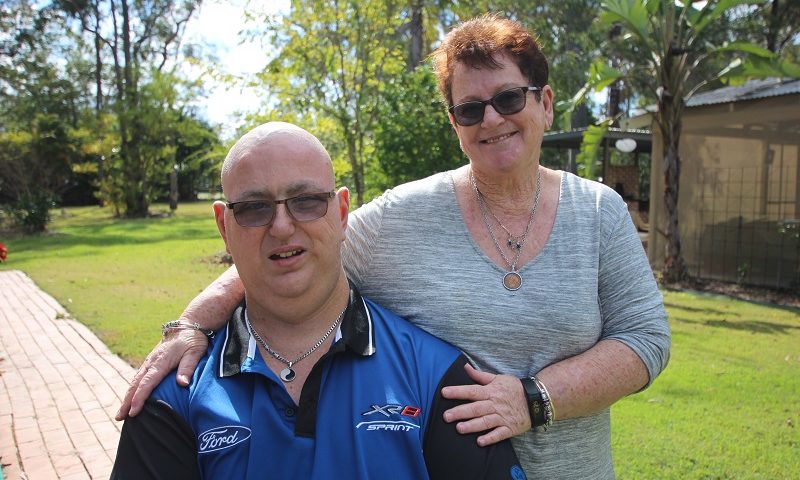Caring for my 40-year-old son with blood cancer

Lynn Simpson is now the carer for her son, Darrin, after his shock blood cancer diagnosis. It’s a role hundreds of parents take on each year as leukaemia remains Australia’s most common childhood cancer.
But Lynn can offer a unique perspective on blood cancer most carers don’t experience: Darrin is 40 years old and intellectually disabled.
Lynn knew one of her biggest challenges was working with healthcare staff to tailor Darrin’s induction to a haematology ward so he was introduced to the new environment and routine in a nurturing and gentle way.
“During and after appointments, I had to re-explain to Darrin a lot of what the doctors had said,” she explained.
“To help him understand what was going on I fed him the information in smaller doses, using smaller words.
“I told him that his blood wasn’t working properly so he had to have chemo to kill off the bad bugs in his system,” she said.
“When the transplant came around, I told him that the chemo didn’t work so we have to get something from someone else’s body to help make some good bugs.”
Lynn says that throughout their experience, Darrin has amazed everyone with his delightful and positive attitude – and thinks ultimately that has helped him handle his treatment and side-effects so well.
“He endeared himself to everyone at the hospital and tolerated treatment really well.
“It’s hard to sometimes keep those feelings locked up and to try to be positive for him.
“But now that he’s gone through it, and he’s looking good, I’m doing fine. We know he will make it through.”
Carer tips
Lynn has shared five tips she found helpful for her and Darrin.
Be honest
If they ask hard questions, answer them – by being honest, it can take away some of the fear. It will be hard for you to talk about things like death, but you need to have that conversation. You can’t hide things; the fear will build as they know you’re being secretive. Darrin also needed to understand what was happening as some of the treatments were going to make him feel sick.
Be positive where appropriate
Darrin feeds off me so I try to show a positive and strong front for him. However, I also make sure to always address any concerns he has.
Find a talking point
Darrin loves the Broncos, so hospital staff would often talk to him about the team when they first met him. It was a great starting point to make Darrin feel comfortable.
Use clear language
I broke it down into parts. Part 1 was chemo. Part 2 was the transplant. Part 3 was coming home and us building him up and getting fit and healthy again. Part 4 would be him going back to his house. By breaking it down into little small steps, he understood it a lot better.
Don’t change how you act
Everyone in our family has still acted normal. No one has stopped treating him the same way – his brother still riles him up!
The Leukaemia Foundation offers a variety of support services for carers, including counselling and informal support groups. Contact us on 1800 620 420 or email info@leukaemia.org.au for more information.
Last updated on August 6th, 2020
Developed by the Leukaemia Foundation in consultation with people living with a blood cancer, Leukaemia Foundation support staff, haematology nursing staff and/or Australian clinical haematologists. This content is provided for information purposes only and we urge you to always seek advice from a registered health care professional for diagnosis, treatment and answers to your medical questions, including the suitability of a particular therapy, service, product or treatment in your circumstances. The Leukaemia Foundation shall not bear any liability for any person relying on the materials contained on this website.